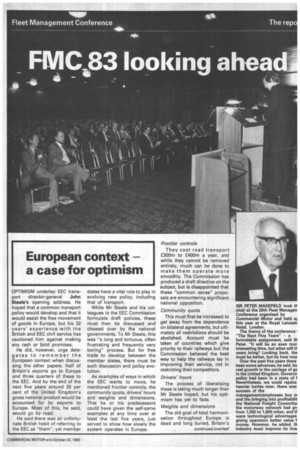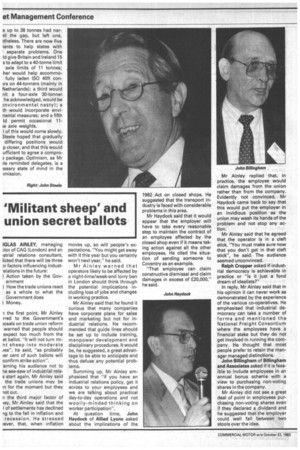European context a case for optimism
Page 27

Page 28

If you've noticed an error in this article please click here to report it so we can fix it.
OPTIMISM underlay EEC transport director-general John Steele's opening address. He hoped that a common transport policy would develop and that it would assist the free movement of goods in Europe, but his 32 years' experience with the British and EEC civil service has cautioned him against making any rash or bold promises.
He did, however, urge delegates to remember the European context when discussing the other papers. Half of Britain's exports go to Europe and three quarters of these to the EEC. And by the end of the next five years around 20 per cent of the United Kingdom's gross national product would be accounted for by exports to Europe. Most of this, he said, would go by road.
He said there was an unfortunate British habit of referring to the EEC as "them", yet member states have a vital role to play in evolving new policy, including that of transport.
While Mr Steele and his colleagues in the EEC Commission formulate draft policies, these must then be discussed and chewed over by the national governments. To Mr Steele, this was "a long and tortuous, often frustrating and frequently very boring" process. But for free trade to develop between the member states, there must be such discussion and policy evolution.
As examples of ways in which the EEC wants to move, he mentioned frontier controls, the community quota, drivers' hours and weights and dimensions. That he or his predecessors could have given the self-same examples at any time over at least the last five years, just served to show how slowly the system operates in Europe. Frontier controls They cost road transport £300m to £400m a year, and while they cannot be removed entirely, much can be done to make them operate more smoothly. The Commission has produced a draft directive on the subject, but is disappointed that these "common sense" proposals are encountering significant national opposition.
Community quota This must first be increased to get away from the dependence on bilateral agreements, but ultimately all restrictions should be abolished. Account must be taken of countries which give priority to their railways but the Commission believed the best way to help the railways lay in improving their service, not in restricting their competitors.
Drivers' hours The process of liberalising these is taking much longer than Mr Steele hoped, but his optimism has yet to fade.
Weights and dimensions The old goal of total harmonisation throughout Europe is dead and long buried. Britain's continued overleaf e up to 38 tonnes had narK1 the gap, but left one, )theless. There are now five lents to help states with separate problems. One Id give Britain and Ireland 15 s to adapt to a 40-tonne limit axle limits of 11 tonnes; her would help accommofully laden ISO 40ft conH:s on 44-tanners (mainly in Netherlands); a third would nit a four-axle 30-boner he acknowledged, would be .nvironmental nasty); a th would incorporate envinental measures; and a fifth Id permit occasional 11e axle weights.
I of this would come slowly. Steele hoped that gradually differing positions would p closer, and that this would ufficient to agree a compro3 package. Optimism, as Mr )le reminded delegates, is a 3ssary state of mind in the
Right: John Steele
































































































